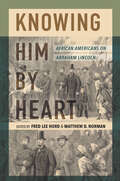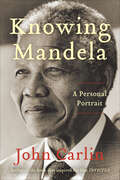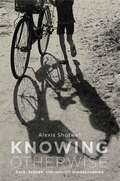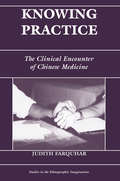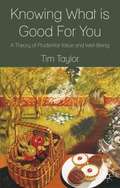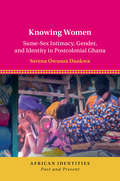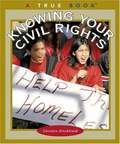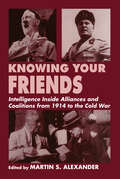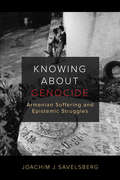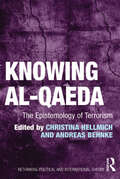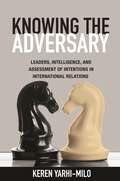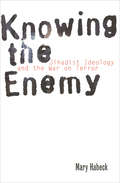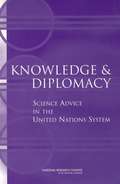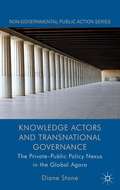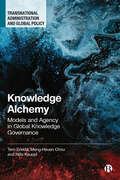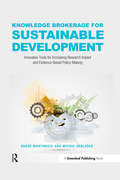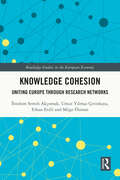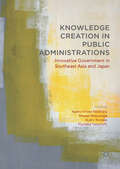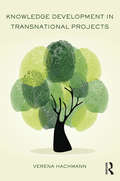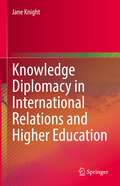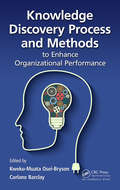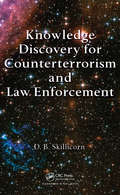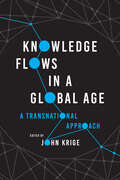- Table View
- List View
Knowing Him by Heart: African Americans on Abraham Lincoln
by Frederick Douglass James Smith Julius Lester Barack Obama Clarence Thomas Langston Hughes Benjamin Quarles John Hope Franklin Daisy Bates Elizabeth Keckley Mary Frances Berry Richard Carwardine James Weldon Johnson Paul Laurence Dunbar T. Thomas Fortune James Oakes Douglas L. Wilson Charles Chesnutt Gwendolyn Brooks W. E. Du Bois George Washington Vincent Harding Jackie Robinson Sojourner Truth Henry Johnson St. Clair Drake Thomas Hamilton Michael Burlingame Matthew Pinsker Kelly Miller Elizabeth Thomas Rodney O. Davis Hannah Johnson Walter White John Proctor Claude McKay Booker T Washington Martin Delany Robert Hamilton Henry Louis Gates Jr Henry Highland Garnet Edna Greene Medford Alice Dunbar-Nelson Thurgood Marshall Gerald J Prokopowicz John R Sellers Jennifer L Weber H. Ford Douglas Jabez P Campbell Henry McNeal Turner Daniel Alexander Payne Philip A Bell Edward M Thomas Alfred P Smith Frances Ellen Harper George B Vashon Thomas Strother Ezra R Johnson Alexander T Cps Alexander T Augusta Jeremiah B Sanderson Osborne P Anderson Thomas Morris Chester James H Hudson Robert Purvis Leonard A Grimes Jeremiah Asher John Willis Menard Henry African Civilization Society William Florville Thomas R Street John H Morgan Mattild Burr Amos G Beman Richard H Cain Jean Baptiste Roudanez Arnold Bertonneau George E North Carolina Freedmen Don Carlos Rutter George E Stephens James W.C Pennington S. W. Africano" Annie Davis S. W. Chase Isaac J Hill Alexander H Newton Jacob Thomas Angeline R Demby Henry O Wagoner George W Le Vere Paul Trevigne Thomas N.C Liverpool H Cordelia Emmanuel K Love William S Scarborough John Mercer Langston Peter H Clark Ews Hammond Charles W Anderson Harriet Tubman Julius F Taylor Ida B Wells-Barnett Archibald H Grimke Elizabeth Keckly William A Sinclair Jesse Max Barber Mary Church Terrell Reverdy C Ransom William Monroe Trotter Maude K Griffin Hightower T Kealing Silas X Floyd George L Knox Thomas S Inborden George W Henderson William Pickens Etta M. Cottin John M Gandy Fred R Moore Sylvanie F Williams Harry C Smith James H Magee James L Curtis John W. Bowen Sr Cora J Ball Thomas Nelson Baker Josephine Silone Yates William H Lewis John H Murphy Sr Robert R Wright Sr Theophile T Allain Oliva Ward Bush-Banks Richard W Gadsden Edward A Johnson Hubert H Harrison Carter G Woodson Robert R Moton Georgia Douglas Johnson Lamar Perkins Samuel A Haynes William E Lilly Robert L Vann William Lloyd Imes Eugene Gordon Arthur W Mitchell Grace Evans Aaron H Payne Roscoe Conkling Simmons Joel A Rogers Mary McLeod Bethune Ella Baker Luther Porter Jackson Willard Townsend Ralph J Bunche Roy Wilkins Mordecai W Johnson Carl J Murphy Martin Luther King Jr Edith Sampson Charles H Wesley Julius Malcolm X Lerone Bennett Jr Henry Lee Moon John H Sengstacke Norman E. Hodges Arvarh E. Strickland Barbara Jeanne FieldsThough not blind to Abraham Lincoln's imperfections, Black Americans long ago laid a heartfelt claim to his legacy. At the same time, they have consciously reshaped the sixteenth president's image for their own social and political ends. Frederick Hord and Matthew D. Norman's anthology explores the complex nature of views on Lincoln through the writings and thought of Frederick Douglass, Ida B. Wells-Barnett, Mary McLeod Bethune, Thurgood Marshall, Malcolm X, Gwendolyn Brooks, Barbara Jeanne Fields, Barack Obama, and dozens of others. The selections move from speeches to letters to book excerpts, mapping the changing contours of the bond--emotional and intellectual--between Lincoln and Black Americans over the span of one hundred and fifty years. A comprehensive and valuable reader, Knowing Him by Heart examines Lincoln’s still-evolving place in Black American thought.
Knowing Mandela: A Personal Portrait
by John CarlinThe acclaimed journalist shares a “thoughtful blend of biography and personal encounters” with the South African president and anti-apartheid activist (Publishers Weekly).Equal parts freedom fighter and statesman, Nelson Mandela built a legacy that places him in the pantheon of history’s most exemplary leaders. In Knowing Mandela, journalist John Carlin offers an intimate portrait of Mandela the man.As a foreign correspondent based in South Africa, Carlin had unique access to Mandela during the post-apartheid years when the transformative leader faced his most daunting obstacles and achieved his greatest triumphs. Carlin witnessed history as Mandela was released from prison after twenty-seven years and ultimately ascended to the presidency of his strife-torn country.Drawing on exclusive conversations with Mandela and countless interviews with people who were close to him, Carlin has crafted an account of a man who was neither saint nor superman. Mandela’s seismic political victories were won at the cost of much personal unhappiness and disappointment.
Knowing Otherwise: Race, Gender, and Implicit Understanding (G - Reference, Information and Interdisciplinary Subjects)
by Alexis ShotwellPrejudice is often not a conscious attitude: because of ingrained habits in relating to the world, one may act in prejudiced ways toward others without explicitly understanding the meaning of one’s actions. Similarly, one may know how to do certain things, like ride a bicycle, without being able to articulate in words what that knowledge is. These are examples of what Alexis Shotwell discusses in Knowing Otherwise as phenomena of “implicit understanding.” Presenting a systematic analysis of this concept, she highlights how this kind of understanding may be used to ground positive political and social change, such as combating racism in its less overt and more deep-rooted forms. Shotwell begins by distinguishing four basic types of implicit understanding: nonpropositional, skill-based, or practical knowledge; embodied knowledge; potentially propositional knowledge; and affective knowledge. She then develops the notion of a racialized and gendered “common sense,” drawing on Gramsci and critical race theorists, and clarifies the idea of embodied knowledge by showing how it operates in the realm of aesthetics. She also examines the role that both negative affects, like shame, and positive affects, like sympathy, can play in moving us away from racism and toward political solidarity and social justice. Finally, Shotwell looks at the politicized experience of one’s body in feminist and transgender theories of liberation in order to elucidate the role of situated sensuous knowledge in bringing about social change and political transformation.
Knowing Practice: The Clinical Encounter of Chinese Medicine (Studies in the Ethnographic Imagination)
by Judith FarquharThis book examines the theory and practice of traditional medicine in modern China. Farquhar describes the logic of diagnosis and treatment from the inside perspective of doctors and scholars. She demonstrates how theoretical and textual materials interweave with the practical requirements of the clinic. By showing how Chinese medical choices are made, she considers problems of agency in relation to different forms of knowledge. Knowing Practice will be of value not only to anthropologists interested in medical practice but also to historians and sociologists interested in the social life of technical expertise and traditional teachings.
Knowing What is Good for You: A Theory of Prudential Value and Well-Being
by Tim E. TaylorAn examination of the philosophical issues surrounding prudential value: what it is for something to be good for a person; and well-being: what it is for someone's life to go well. It critically analyses competing approaches, and proposes a new subjective account that addresses key weaknesses of existing theories.
Knowing Women: Same-Sex Intimacy, Gender, and Identity in Postcolonial Ghana (African Identities: Past and Present)
by Serena Owusua DankwaKnowing Women is a study of same-sex desire in West Africa, which explores the lives and friendships of working-class women in southern Ghana who are intimately involved with each other. Based on in-depth research of the life histories of women in the region, Serena O. Dankwa highlights the vibrancy of everyday same-sex intimacies that have not been captured in a globally pervasive language of sexual identity. Paying close attention to the women's practices of self-reference, Dankwa refers to them as 'knowing women' in a way that both distinguishes them from, and relates them to categories such as lesbian or supi, a Ghanaian term for female friend. In doing so, this study is not only a significant contribution to the field of global queer studies in which both women and Africa have been underrepresented, but a starting point to further theorize the relation between gender, kinship, and sexuality that is key to queer, feminist, and postcolonial theories. This title is also available as Open Access on Cambridge Core.
Knowing Your Civil Rights (True Books)
by Christin Ditchfield<p>One of the few civics series targeted at the elementary grade level. Most civics books are aimed at middle school or older students. <p> <li>Good introduction for 3rd to 5th graders on the basics of civics. <li>Cross-curricular material includes information about American history as well as government and politics. <li>Index helps readers find key subject matter quickly. <li>"To Find Out More" section directs readers to other books, organizations, and web sites for further information on the subject. <li>Sidebars enhance the text by providing additional facts and information.</li> </p>
Knowing Your Friends: Intelligence Inside Alliances and Coalitions from 1914 to the Cold War (Studies in Intelligence)
by Martin S. AlexanderLittle attention has been paid to the murky, ultra-business of gathering intelligence among and forming estimates about friendly powers, and friendly or allied military forces. How rarely have scholars troubled to discover when states entered into coalitions or alliances mainly and explicitly because their intelligence evaluation of the potential partner concluded that making the alliance was, from the originator's national security interest, the best game in town. The twentieth century has been chosen to enhance the coherence of and connections between, the subject matter of this under-explored part of intelligence studies.
Knowing about Genocide: Armenian Suffering and Epistemic Struggles
by Joachim J. SavelsbergA free open access ebook is available upon publication. Learn more at www.luminosoa.org. This book is freely available in an open access edition thanks to TOME (Toward an Open Monograph Ecosystem)—a collaboration of the Association of American Universities, the Association of University Presses, and the Association of Research Libraries—and the generous support of the University of Minnesota. Learn more at the TOME website, available at openmonographs.org. How do victims and perpetrators generate conflicting knowledge about genocide? Using a sociology of knowledge approach, Savelsberg answers this question for the Armenian genocide committed in the context of the First World War. Focusing on Armenians and Turks, he examines strategies of silencing, denial, and acknowledgment in everyday interaction, public rituals, law, and politics. Drawing on interviews, ethnographic accounts, documents, and eyewitness testimony, Savelsberg illuminates the social processes that drive dueling versions of history. He reveals counterproductive consequences of denial in an age of human rights hegemony, with implications for populist disinformation campaigns against overwhelming evidence.
Knowing al-Qaeda: The Epistemology of Terrorism (Rethinking Political and International Theory)
by Christina HellmichDespite a plethora of studies devoted to it, the current understanding of al-Qaeda and the threat it poses remains vague and ambiguous. Is al-Qaeda a rigidly structured organisation, a global network of semi-independent cells, a franchise, or simply an ideology? What role did Osama bin Laden play within the group and its terrorist campaign? What does it mean to talk about the "global Salafi-jihad" threat allegedly confronting the West? In addressing such questions many writers have sought to offer definitive answers, yet overall the truth about al-Qaeda remains elusive. This book moves beyond this traditional approach in order to investigate and critically assess how such answers reflect the particular epistemological frameworks within which they are produced. Its chapters explore the varied contexts within which the obscure entity labelled al-Qaeda is constituted as a comprehensible object of political, strategic, cultural, and scientific knowledge, and within which 'terrorism' is rendered an experience of quotidian life. This volume offers a much-needed critical reflection on Western ways of talking and of thinking about the frightening experience of global terrorism. In trying to know how we know al-Qaeda, it offers us an opportunity to try to know ourselves and our often hidden assumptions about legitimacy, violence, and political purpose.
Knowing the Adversary: Leaders, Intelligence, and Assessment of Intentions in International Relations (Princeton Studies in International History and Politics #146)
by Keren Yarhi-MiloStates are more likely to engage in risky and destabilizing actions such as military buildups and preemptive strikes if they believe their adversaries pose a tangible threat. Yet despite the crucial importance of this issue, we don't know enough about how states and their leaders draw inferences about their adversaries' long-term intentions. Knowing the Adversary draws on a wealth of historical archival evidence to shed new light on how world leaders and intelligence organizations actually make these assessments.Keren Yarhi-Milo examines three cases: Britain's assessments of Nazi Germany's intentions in the 1930s, America's assessments of the Soviet Union's intentions during the Carter administration, and the Reagan administration's assessments of Soviet intentions near the end of the Cold War. She advances a new theoretical framework—called selective attention—that emphasizes organizational dynamics, personal diplomatic interactions, and cognitive and affective factors. Yarhi-Milo finds that decision makers don't pay as much attention to those aspects of state behavior that major theories of international politics claim they do. Instead, they tend to determine the intentions of adversaries on the basis of preexisting beliefs, theories, and personal impressions. Yarhi-Milo also shows how intelligence organizations rely on very different indicators than decision makers, focusing more on changes in the military capabilities of adversaries.Knowing the Adversary provides a clearer picture of the historical validity of existing theories, and broadens our understanding of the important role that diplomacy plays in international security.
Knowing the Enemy: Jihadist Ideology and the War on Terror
by Mary Habeck&“In considerable detail and with admirable clarity, [Habeck] contributes one of the most valuable books on the ongoing Middle East—and world—crisis&” (Booklist, starred review). After September 11, Americans agonized over why nineteen men hated the United States enough to kill three thousand civilians in an unprovoked assault. Analysts have offered a wide variety of explanations for the attack, but the one voice missing is that of the terrorists themselves. This penetrating book is the first to present the inner logic of al-Qaeda and like-minded extremist groups by which they justify September 11 and other terrorist attacks. Mary Habeck explains that these extremist groups belong to a new movement—known as jihadism—with a specific ideology based on the thought of Muhammad ibn Abd al-Wahhab, Hasan al-Banna, and Sayyid Qutb. Jihadist ideology contains new definitions of the unity of God and of jihad, which allow members to call for the destruction of democracy and the United States and to murder innocent men, women, and children. Habeck also suggests how the United States might defeat the jihadis, using their own ideology against them. &“Concise and sober . . . Quite simply the best single volume currently available on this topic.&” —Los Angeles Times &“Knowing the Enemy is vital in the struggle of ideas.&” —Theo Hartman, Centre for Research on Geopolitics &“A level-headed, intelligent, thorough and accessible survey of modern Islamic militant thinking.&” —The Guardian &“[An] important and necessary new book . . . It demonstrates an insight and forthrightness rare among Western pundits.&” —The New York Sun &“A succinct and useful guide.&” —The Wall Street Journal
Knowledge & Diplomacy: Science Advice In The United Nations System
by Committee for Survey Analysis of Science Advice on Sustainable Development to International OrganizationsIn the international effort to advance human health, welfare, and development while better managing and conserving the environment and natural resources, there is a clear and growing recognition of the role of scientific and technical knowledge in global governance. This has created an urgent need for the United Nations to equip itself with the capability to bring scientific knowledge to inform international decision making. Given the complexity and diversity of United Nations programs, organs, and mandates, this report focuses on the main functions of the United Nations that affect international governance in the fields related to sustainable development, with reference to the taxonomy of the key United Nations organs in which these functions are undertaken. Efforts have been made to ensure that the major categories of United Nations organs have been covered and therefore the results of the review are representative of the functioning of the United Nations system.
Knowledge Actors and Transnational Governance
by Diane StoneDiane Stone addresses the network alliances or partnerships of international organisations with knowledge organisations and networks. Moving beyond more common studies of industrial public-private partnerships, she addresses how, and why, international organisations and global policy actors need to incorporate ideas, expertise and scientific opinion into their 'global programmes'. Rather than assuming that the encouragement for 'evidence-informed policy' in global and regional institutions of governance is an indisputable public good, she queries the influence of expert actors in the growing number of part-private or semi-public policy networks.
Knowledge Alchemy: Models and Agency in Global Knowledge Governance (Transnational Administration and Global Policy)
by Tero Erkkilä Niilo Kauppi Meng-Hsuan ChouThis book introduces the concept of ‘knowledge alchemy’ to capture the generic process of transforming mundane practices and policies of governance into competitive ones following imagined global gold standards. Using examples from North America, Europe and Asia, it explores how knowledge alchemy increasingly informs national and institutional policies and practices on economic performance, higher education, research and innovation. The book examines how governments around the world have embraced global models of world-class university, human capital and talent competition as essential in ensuring national competitiveness. Through its analysis, the book shows how this strongly future-oriented and anticipatory knowledge governance is steered by a surge of global classifications, rankings and indicators, resulting in numerous comparisons of various domains that today form more constraining global policy scripts.
Knowledge Brokerage for Sustainable Development: Innovative Tools for Increasing Research Impact and Evidence-Based Policy-Making
by André Martinuzzi Michal SedlackoThe menace of a post-truth era challenges conventional policy-making and science. Instead of fighting an uphill battle against populist solutions, those involved in both policy-making and science have to find innovative ways to collaborate, and make use of the vast amounts of knowledge that are already available. Knowledge brokerage, in this context, is more than a simple question-and-answer game: it is a process of co-creating and re-framing knowledge. In addition, Knowledge Brokerage for Sustainable Development has to deal with trade-offs and ambiguities, as well as world-views, cultures and the preferences of stakeholder groups. This book is the first in-depth exploration of how knowledge brokerage has the potential to help manage the challenges of sustainable development across political and scientific systems. It presents a selection of innovative and practical tools to enhance the connectivity of research and policy-making on sustainable development issues. In doing so, this book will be an essential publication in research and policy-making. It supports networking among the developers and users of knowledge brokerage systems and will make their experience better known to the different communities involved.The book presents interviews with leading policymakers and researchers such as former EU Commissioner Franz Fischler, Robert-Jan Smits (Director-General of Research and Innovation at the EC), Uwe Schneidewind (President of the Wuppertal Institute), and Leida Rijnhout (European Environmental Bureau). It also provides insights into eleven EU funded projects dealing with different approaches of Knowledge Brokerage for Sustainable Development.
Knowledge Cohesion: Uniting Europe Through Research Networks (Routledge Studies in the European Economy)
by Müge Özman Erkan Erdil İbrahim Semih Akçomak Umut Yılmaz ÇetinkayaResearch collaboration plays a pivotal role in not only disseminating existing knowledge but also catalyzing the generation of novel insights. This book delves into the benefits that arise from research collaborations, shedding light on their multifaceted impacts. It serves as a pioneering exploration into the nexus of collaboration, knowledge convergence, and knowledge cohesion, drawing extensively from the rich literature on the EU's cohesion policy and collaboration-induced knowledge diffusion.Firstly, Knowledge Cohesion: Uniting Europe Through Research Networks unravels the nuanced interplay among collaboration, knowledge convergence, and knowledge cohesion. Secondly, it carves out clear distinctions between the realms of convergence and cohesion. Lastly, it unveils an empirical framework, offering tools for quantifying and analysing knowledge cohesion. These contributions culminate in the conceptualisation of knowledge cohesion, enriching our understanding of how collaborative research profoundly impacts the advancement of knowledge. The empirical analyses show that while the research collaboration network indicates knowledge convergence, there is no evidence for knowledge cohesion in Europe.This book stands as a resource for scholars, policymakers, and practitioners alike, inviting them to explore the nuanced interplay of research collaboration and knowledge dynamics, while presenting knowledge cohesion as a new concept.
Knowledge Creation in Public Administrations
by Ikujiro Nonaka Ayano Hirose Nishihara Masaei Matsunaga Kiyotaka YokomichiThis book presents a new paradigm of innovative governments in Asia, at the municipal, regional and national levels, based on the knowledge creation theory in management, and leading to organizational transformation and policy reform in public administration. Focusing on Indonesia, the Philippines, Thailand, Vietnam, and Japan, the book is based on the findings of a joint research project established to identify the factors that impact the effectiveness or performance of public administration by applying the knowledge-based management theory that originates in private sectors to public sector management.
Knowledge Development in Transnational Projects
by Verena HachmannTransnational learning has become a buzz phrase in European policy-making and in multi-national business. Learning from the experiences of others is an idea that captivates practitioners and academics alike due to its simplicity and availability in a world that is increasingly characterised by cross-border and global connections. European regions in particular offer a diverse range of solutions to often shared challenges. This provides a knowledge base for other regions to draw on, through regional success stories, publications of ‘best practice’ and EU cooperation programmes. This books explores ‘transnational learning and knowledge transfer’ in co-operation programmes and projects. It argues that a deeper understanding of learning needs to be central to the implementation of programmes and projects in order to successfully meet their desired outcomes and goals. By characterising some of the most important preconditions of transnational learning and introducing a process perspective to learning and transfer, this book identifies barriers to learning and knowledge transfer and contributes to a stronger conceptualisation of the topic. In doing so, it opens up the ‘black-box’ of transnational learning and knowledge development, providing a better understanding of its inner mechanisms. It also provides practical recommendations for policy makers and practitioners involved both at the programme and project level of transnational EU initiatives. This book will be of interest to students, researchers, and policy makers alike working in geography, political studies, legal studies and European studies.
Knowledge Diplomacy in International Relations and Higher Education
by Jane KnightThis book addresses the understudied phenomenon of why and how contemporary international higher education, research and innovation can contribute to strengthening international relations. The author proposes the concept of knowledge diplomacy and carefully examines its fundamental rationales, actors, principles, instruments, and strategies. This is the first book that compares the similarities and differences between knowledge diplomacy and related terms such as soft power, cultural diplomacy, science diplomacy and public diplomacy to capture the expanding role of international higher education and research in bilateral and multilateral relations. The analysis of initiatives from around the world helps to ground and illustrate the key features of a knowledge diplomacy approach. "This book makes a highly original and important contribution to the study of knowledge diplomacy and soft power. It brings together the latest thinking and trends in the study of contemporary diplomacy and international higher education. The author is well known for the clarity and perspicacity of her definitions and analysis and this applies to her in-depth examination of knowledge diplomacy which she convincingly distinguishes from soft power and other forms of diplomacy. The discussion of issues and challenges which require further exploration and research will be valuable to international relations and international higher education scholars, policy makers and students.” Professor Ruth Hayhoe, University of Toronto, and President Emerita, the Education University of Hong Kong "This timely book offers a sound framework for studying the expanding role of higher education, research and innovation in international relations. A key strength is that viewpoints and experiences from all of the world’s regions have been included in this lucid, interdisciplinary contribution to our understanding of knowledge diplomacy.” Professor Jan Melissen, Leiden University and University of Antwerp, Editor-in-Chief The Hague Journal of Diplomacy “This is a must-read book for scholars, policy makers and diplomats who want to understand how international higher education, research and innovation can help to address the complexities of contemporary global challenges through knowledge diplomacy.". Professor Chika Sehoole, Pretoria University, South Africa
Knowledge Discovery Process and Methods to Enhance Organizational Performance
by Kweku-Muata Osei-Bryson Corlane BarclayAlthough the terms "data mining" and "knowledge discovery and data mining" (KDDM) are sometimes used interchangeably, data mining is actually just one step in the KDDM process. Data mining is the process of extracting useful information from data, while KDDM is the coordinated process of understanding the business and mining the data in order to identify previously unknown patterns.Knowledge Discovery Process and Methods to Enhance Organizational Performance explains the knowledge discovery and data mining (KDDM) process in a manner that makes it easy for readers to implement. Sharing the insights of international KDDM experts, it details powerful strategies, models, and techniques for managing the full cycle of knowledge discovery projects. The book supplies a process-centric view of how to implement successful data mining projects through the use of the KDDM process. It discusses the implications of data mining including security, privacy, ethical and legal considerations. Provides an introduction to KDDM, including the various models adopted in academia and industry Details critical success factors for KDDM projects as well as the impact of poor quality data or inaccessibility to data on KDDM projects Proposes the use of hybrid approaches that couple data mining with other analytic techniques (e.g., data envelopment analysis, cluster analysis, and neural networks) to derive greater value and utility Demonstrates the applicability of the KDDM process beyond analytics Shares experiences of implementing and applying various stages of the KDDM process in organizations The book includes case study examples of KDDM applications in business and government. After reading this book, you will understand the critical success factors required to develop robust data mining objectives that are in alignment with your organization’s strategic business objectives.
Knowledge Discovery for Counterterrorism and Law Enforcement (Chapman & Hall/CRC Data Mining and Knowledge Discovery Series)
by David SkillicornMost of the research aimed at counterterrorism, fraud detection, or other forensic applications assumes that this is a specialized application domain for mainstream knowledge discovery. Unfortunately, knowledge discovery changes completely when the datasets being used have been manipulated in order to conceal some underlying activity. Knowledge Dis
Knowledge Flows in a Global Age: A Transnational Approach
by John KrigeA transnational approach to understanding and analyzing knowledge circulation. The contributors to this collection focus on what happens to knowledge and know-how at national borders. Rather than treating it as flowing like currents across them, or diffusing out from center to periphery, they stress the human intervention that shapes how knowledge is processed, mobilized, and repurposed in transnational transactions to serve diverse interests, constraints, and environments. The chapters consider both what knowledge travels and how it travels across borders of varying permeability that impede or facilitate its movement. They look closely at a variety of platforms and objects of knowledge, from tangible commodities—like hybrid wheat seeds, penicillin, Robusta coffee, naval weaponry, seed banks, satellites and high-performance computers—to the more conceptual apparatuses of plant phenotype data and statistics. Moreover, this volume decenters the Global North, tracking how knowledge moves along multiple paths across the borders of Mexico, India, Portugal, Guinea-Bissau, the Soviet Union, China, Angola, Palestine and the West Bank, as well as the United States and the United Kingdom. An important new work of transnational history, this collection recasts the way we understand and analyze knowledge circulation.
Knowledge Flows in a Global Age: A Transnational Approach
by John KrigeA transnational approach to understanding and analyzing knowledge circulation. The contributors to this collection focus on what happens to knowledge and know-how at national borders. Rather than treating it as flowing like currents across them, or diffusing out from center to periphery, they stress the human intervention that shapes how knowledge is processed, mobilized, and repurposed in transnational transactions to serve diverse interests, constraints, and environments. The chapters consider both what knowledge travels and how it travels across borders of varying permeability that impede or facilitate its movement. They look closely at a variety of platforms and objects of knowledge, from tangible commodities—like hybrid wheat seeds, penicillin, Robusta coffee, naval weaponry, seed banks, satellites and high-performance computers—to the more conceptual apparatuses of plant phenotype data and statistics. Moreover, this volume decenters the Global North, tracking how knowledge moves along multiple paths across the borders of Mexico, India, Portugal, Guinea-Bissau, the Soviet Union, China, Angola, Palestine and the West Bank, as well as the United States and the United Kingdom. An important new work of transnational history, this collection recasts the way we understand and analyze knowledge circulation.
Knowledge Flows in a Global Age: A Transnational Approach
by John KrigeA transnational approach to understanding and analyzing knowledge circulation. The contributors to this collection focus on what happens to knowledge and know-how at national borders. Rather than treating it as flowing like currents across them, or diffusing out from center to periphery, they stress the human intervention that shapes how knowledge is processed, mobilized, and repurposed in transnational transactions to serve diverse interests, constraints, and environments. The chapters consider both what knowledge travels and how it travels across borders of varying permeability that impede or facilitate its movement. They look closely at a variety of platforms and objects of knowledge, from tangible commodities—like hybrid wheat seeds, penicillin, Robusta coffee, naval weaponry, seed banks, satellites and high-performance computers—to the more conceptual apparatuses of plant phenotype data and statistics. Moreover, this volume decenters the Global North, tracking how knowledge moves along multiple paths across the borders of Mexico, India, Portugal, Guinea-Bissau, the Soviet Union, China, Angola, Palestine and the West Bank, as well as the United States and the United Kingdom. An important new work of transnational history, this collection recasts the way we understand and analyze knowledge circulation.
